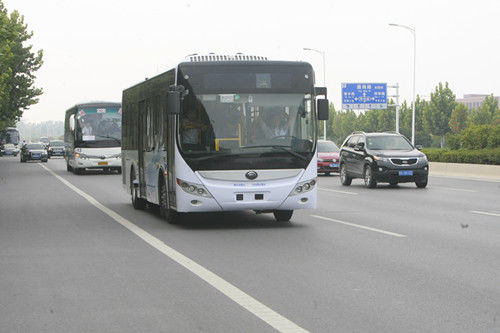After three years of development, one of the leading Chinese bus manufacturers Yutong has sent the prototype of a self-driving city bus on a 32 km long circuit on an intercity road between Zhengzhou and Kaifeng in Henan Province. The bus drove the whole track in regular traffic without any human assistance, attained a peak speed of 68 km/h, passed 26 traffic lights and was able to change lanes and overtake autonomously. This is a significant accomplishment and clearly puts Yutong on the map for autonomous driving.
The bus is equipped with many sensors, including camera and Lidar. Two Lidar sensors are strategically placed in the middle of both sides of the car. This is the best way to monitor the adjacent lanes and mimics the approach Google has taken on their driverless pods (where the side Lidars protrude like the mirrors of conventional cars).

Image source: Yutong, 2015.
The company’s press release points out that significant additional development is required. No further information about the timeline for the introduction of such a bus was provided.
Self-driving buses are very promising and will be a key ingredient of future mobility. On demand-buses will be able to service the complex mobility demands of our societies much better than today’s mix of scheduled buses, trains, and individual cars. They will lower the cost, resource consumption and ecological footprint of mobility. Because significantly lower costs will prompt many travelers to use buses on medium to long-distance trips instead of cars, these buses will increase the effective capacity of highways when measured in people-miles.
Source: Yutong Bus Company, Dailymotion video
Update 2016-02-21: The bus traveled between Zhengzhou and Kaifeng in Henan Province. The approximate route can be looked up on Google maps.

